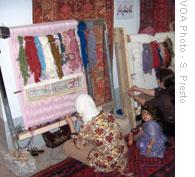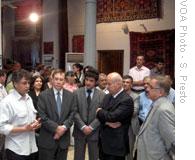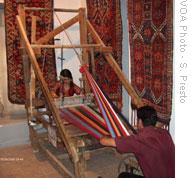VOA标准英语2008年-Weaving Project Revives Traditions, Empowers Ku(在线收听)
By Suzanne Presto
Irbil
17 June 2008
The Kurdish Textile Museum in Irbil has launched a new program aimed at creating job opportunities for women, while reviving traditional Kurdish weaving skills. VOA's Suzanne Presto in Irbil attended the opening ceremony for the program that gives elderly tribal weavers the chance to teach their skills to younger women and create textiles to sell.
 |
| Shiler Hamadamin Aziz weaves at the loom |
Shiler Hamadamin Aziz passes the yarn between the loom's threads with ease, her feet working the wooden pedals. She is making what appears to be a shawl, and it lengthens millimeter by millimeter with each pass. The 28-year-old Kurdish woman looks as if she has been doing this for years.
But Aziz has only been at this for two weeks, under the attentive eye of Zara Qadir Hussein, a Kurdish woman who has been making traditional textiles for more than 30 years.
Aziz is one of 16 young weavers participating in the Women's Income Generation Training Project at the Kurdish Textile Museum in Irbil's Citadel.
 |
| Kurdish Textile Museum's founder and director Lolan Cipan, U.S. Regional Coordinator Jess Baily, translator, Governor Nazhad Hadi, and general director of Kurdistan's Ministry of Culture Kanan Mufti (from left to right) |
The program was conceived by Lolan Cipan, the museum's founder and director. Cipan's passion for Kurdish textiles began when he was child, watching his grandmother as she would weave rugs.
"I have been working to revive Kurdish handicrafts, particularly textiles, for many, many years," said Cipan. "So, I have these nomadic old women, they have been working for me for many years at their homes. And I thought because they are very old and they get sick very often, so I thought to bring them here to Citadel and to transfer the weaving skills to younger generations."
He says the goal of the project is two-fold, to give women income-generating opportunities while reviving traditional Kurdish weaving. Cipan says the art of textile making is vanishing from Kurdistan, and master weavers are difficult to find.
"Actually, very very few. You can say it has totally died out now," he said.
Cipan's project is being funded by the United States Embassy through the Regional Reconstruction Team in Irbil, which gave almost $80,000 to the program. Cipan says that money will provide salaries for the novices and the experts through the end of this year.
Ultimately, he said, the goal is for program to become self-sustaining with the revenue generated from selling the finished carpets, blankets, and woolen socks and hats in the Textile Museum's gift shop.
The U.S. Regional Coordinator, Jess Baily, says insecurity and Saddam Hussein's ethnic cleansing campaign known as Anfal, played a major role in the demise of weaving.
"Sadly, the decades of civil strife and Anfal in the region have uprooted much of this tradition, destroyed the economic basis for it, and left it, if you will, down to a dwindling few who know how to weave and carry on the crafts of their ancestors," said Baily.
Baily added that similar programs that preserve culture and provide income to women from non-urban areas have been successful in neighboring countries.
Irbil's Governor, Nazhad Hadi, said from an economic standpoint this project will not generate a lot of money. But he emphasized that from a cultural standpoint, the project is an excellent step toward reviving Kurdish traditions.
 |
| Novice weavers learn the art of textile making |
But in Cipan's efforts to revive traditional weaving, he encountered some cultural traditions that hampered his efforts.
"Some of the families, they would not allow their daughters or mothers to go to weave in a public place," he said. "So, now I see them, and they are very happy and they work."
New weaver Aziz says she is very happy at work. She says she was drawn to weaving at the massive wooden loom only because she liked the brightly colored yarns her teacher, Hussein, had skillfully strung out. But now the pretty brunette in her deep-red Kurdish dress says weaving is a skill and tradition she can see herself carrying on for a long time to come.
Aziz says she finds satisfaction in carrying on her history while learning a marketable skill.
Hussein says it is a skill that has been, and must be, passed down through the generations.
And, as an expert who has been weaving alongside her husband for decades, who also passed that skill on to her own two children, Hussein says it is a skill that will always be in demand.
So the two women return to their centuries' old work. Aziz goes back to her loom as Hussein spins and twirls a red spool of yarn until it is fine enough to be woven into Aziz's piece.